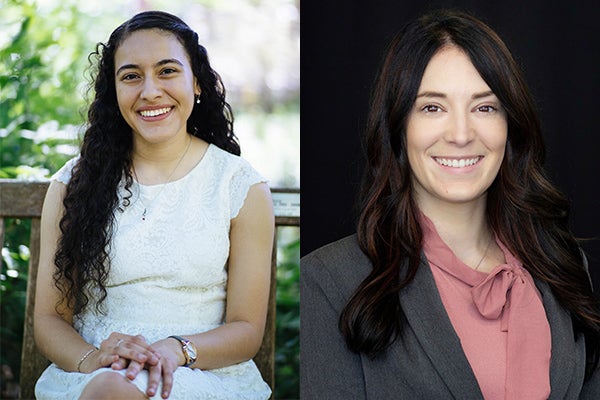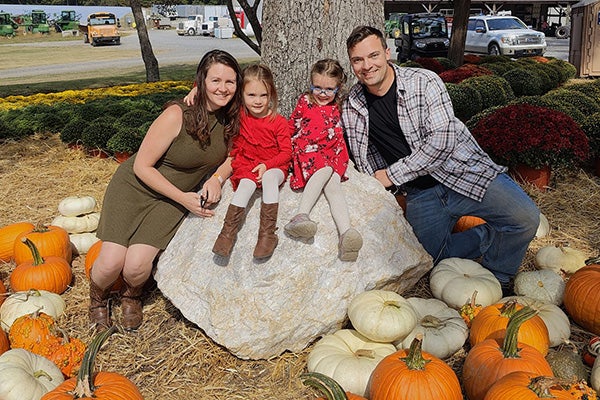ECU Allied Health students awarded prestigious national scholarships
The East Carolina University College of Allied Health Sciences is famous for its selectiveness — last year about 600 potential students applied for just 36 spots in the school’s physician’s assistant studies program. The same can be said for the college’s Department of Communications Sciences and Disorders, where more than 200 applicants vied for just 50 open seats.
So, when a student from an Allied Health Services program receives a competitive, national scholarship you can bet that they are among the best and brightest in the nation.
Rural commitment
Two women from very different, rural parts of the world have made a commitment to rural communities in North Carolina to bring their medical skills to bear in the fight against rural health disparities.
Alice Kenneally was raised in a very small town an hour outside of Cambridge, England, and became a U.S. citizen in 2019 after moving to the States 10 years ago. Hanan Alazzam, is the daughter of immigrants who was raised in Asheboro. Both are in their first year in the physician assistant studies program.

Hanan Alazzam, left, and Alice Kenneally — both first year students in ECU’s Physician Assistant Studies program — earned scholarships from the National Health Service Corps. (Contributed photos)
Kenneally and Alazzam were selected to receive National Health Service Corps scholarships, which provide a stipend during schooling and complete repayment of student loans in exchange for no less than two years of service in a community designated by the federal government as rural and underserved.
Participants in the program can find their own qualifying location to practice in after graduation, or if needed can be paired with a location by the National Health Services Corps, in underserved communities across the 50 states, in an Indian Health Service clinic or a prison.
Both women, however, are interested in staying in North Carolina.
Alazzam spoke Spanish as her first language before attending elementary school and looks forward to returning to her home to serve in a primary care capacity, where she already has some experience.
“I was in family medicine — I was a scribe, a medical assistant and a Spanish interpreter,” said Alazzam, who is trilingual having grown up speaking Arabic with her father. “I was working in a federally qualified health center so I could theoretically go back and work there as a PA.”
Kenneally took on physician assistant schooling after years of working in military medical clinics, conducting research on post traumatic stress disorder. Her later-in-life career change is less of jumping from one ship to another and more changing lanes in the health care sphere.
“I want to do primary care and family medicine, specifically looking very carefully at preventative medicine,” Kenneally said. “With a lot of the health care disparities, we have high rates of cardiovascular disease and diabetes here. I grew up in a rural community in the U.K. so I’d really like to be the local PA, in the local clinic, and do something on small scale in a in a small community that maybe hasn’t had the access to proper primary care or a proper family medicine provider.”
Kenneally has an eye on clinics along the northeast corner of the state, especially the Outer Banks. Her husband, a Marine stationed at Camp Lejeune, will retire soon affording them the flexibility to choose an underserved community that feels right for their family. And her background with psychiatric health care is a consideration for after her cohort of students reaches the second year to begin clinical rotations.
Alazzam and Kenneally both laud the immediate sense of family that they received during their interviews to get into the PA program. Both had interviewed at other North Carolina institutions — some with marquee names — but something about the faculty and the vibe of the campus solidified their decisions to join the Pirate PA program.
“When I was interviewing, I definitely felt like this was the place that I want to be because of just like how rural it is,” Alazzam said. “I wanted to learn from this environment and bring it back to like my hometown, to serve the population there.”
The window for applications to the National Health Service Corps scholarship opened for about a month between April and May, which forced both Kenneally and Alazzam to work quickly to fill out forms and submit supporting documents quickly.
They received word of their acceptance into the program recently and have been buoyed by having the worry of loan repayments removed from their post-graduation considerations.
Dr. Alan Gindoff, the chair of the Department of Physician Assistant Studies, said that Alazzam and Kenneally are in a very unique position, first having been accepted into ECU’s PA program and then to have been awarded the NHSC scholarship.
“I’ve been doing this 20 years, and I’ve seen less than 10,” Gindoff said.
The value of the NHSC program isn’t conceptual for Gindoff — he received tuition repayment instead of the scholarship from the NHSC and served his required time in a small central Texas clinic, where he was quickly integrated into the community.
“I really had a great experience,” Gindoff said. I worked in Rural Health Clinic in Central Texas and our team provided primary care to all on a sliding scale. We were the only source of Medicaid in the county which provided free immunizations to infants and children, which represented the entire Hispanic population of that city, and a good portion of the whites and African Americans, we immunized thousands hundreds of children in the two years I worked at RHC Waller.”
Deeper connection
When she was first notified, Rebecca Cole didn’t know she’d be one of only 12 allied health sciences students in the nation to receive the Association of Schools Advancing Health Professions Scholarship of Excellence for 2022.

Rebecca Cole, a speech language pathology student, poses with her family. Cole received one of 12 national Association of Schools Advancing Health Professions Scholarship of Excellence scholarships. (Contributed photo)
Cole, who lives in Cameron, North Carolina, is a distance education student in the Communications Sciences and Disorders Master’s degree program and is on track to graduate this fall. The program is unique in that it isn’t an online course, but truly a distance education experience requiring students to participate in clinical experiences within their communities and engage with multiple cohorts within the campus community and across the country.
For her clinical rotations, Cole worked in the Harnett County Schools and with a private practice that conducts early interventions like supporting kids with feeding, facial muscle development and swallowing disorders. Cole, a mother of two who experienced similar challenges, was drawn to the connections that she made with her patients’ parents.
“I kind of connect with the parents on a deeper level there,” Cole said. “So, I’m really hoping that an opportunity to keep working with those patients takes off.”
Speech language pathology is a second career for Cole. She sang classical music at the highest levels in Indianapolis alongside her husband, a euphonium player. As an Army spouse and Marine Corps daughter, she continues life with her family at Fort Bragg.
But the life a musician didn’t square with being a new mother.
“I was a singer with a choir in Indianapolis and I was doing all the right things to become a successful musician, but didn’t make a dime,” Cole said. “Kids kind of came into the picture and I realized that being on site for jobs was going to be really difficult.”
The flexibility of the distance education format allowed Cole to be a mom and chase new professional goals. And with the help of the Association of Schools Advancing Health Professions Scholarship those goals are a little closer to being in reach.